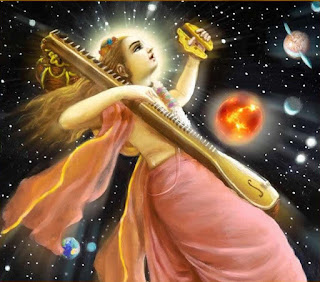Sutra 6. Yajjnaatwa matto bhavati sthabdho bhavatyaatmaaraamo bhavati.
(By knowing which man becomes intoxicated (or overjoyed) peaceful
and completely immersed in the enjoyment of the Bliss of the Atman. )
Yat Jnaatwa: Having Known (God)
(Puman: A
person, this Puman expression is implied for each verse giving the signs of a devotee immersed in divine love)
Mattah Bhavati: Becomes Intoxicated; overjoyed
Sthabdha Bhavati: Becomes quiet,peaceful
Aatmaraamah Bhavati: Exists as one continually enjoying the bliss of the Atman
The description of a realized devotee is continued. In this Sutra
the author says “By knowing That” (by “That” he means God).
But in the
previous Sutra he says “On obtaining That” and there he means love.
Jnaatwa: Previous expressions were “Labdhwa” ‘having gained’ and
‘Prapya’ ‘having attained’. Now it is “having known.”
(Difference between Labdhwa (gained), Praapya (Obtained) and Jnaatwa (Having known) is very significant in the path of devotion.
In the initial stages of devotion, as it was explained by the
Author a week before in his talk on purpose and fructification of Bhajan singing in a Sai centre in Oman, the devotee gets some new experience when he enters a Sai centre, starts participating in Bhajans etc. This was explained by the author as Gaining proximity to God and melting his ego.
Author a week before in his talk on purpose and fructification of Bhajan singing in a Sai centre in Oman, the devotee gets some new experience when he enters a Sai centre, starts participating in Bhajans etc. This was explained by the author as Gaining proximity to God and melting his ego.
This is Labdhwa- gaining.
Once he has tested this new found experience, he has to work towards getting more and more of such moments of bliss. He learns and sings Bhajans with an urge to get more and more nearer to God, This was explained in the talk as Finding God and placing God.
This is Praapya- Obtaining. For this efforts have to be made.
When the egos gone, when the heart itself has melted in Love, when week after week, seated in Bhajan, the devotee finds God now for longer and longer duration and not only during the 1 hour bhajan session, then his heart has expanded with Love. This is the state where he gets the subjective experience of Godhood, which is LOVE or BLISS, whatever one may call it as.
This is Jnaatwa- Knowing God where, it is not Knowing like one knows his wife, his manager, his children, his place etc, where all these are different from himself but here, the knowing means- the devotee is Knowledge himself.
The God who was hanging in a portrait in his centre hither to, has merged with the devotee or the devotee has emerged with the God and both have dissolved in the ocean of LOVE- Prema Sagara, Sai Rama.
In this context, a verse from Atma bodha was referred in the recently concluded talk in Sadan on Purpose of Bhajan, which is reproduced here.
AJNANA KALUSHAM JIVAM JNANA ABHYAASAAD VI NIRMALAM
KRTVA JNAANAM SVAYAM NASYET JALAM KATAKA RENUVAT
Kataka nut, when it is placed/ dropped in a glass of water with dirt, the nut clears all the dirt in the water, renders the water pure and also, in the process, dissolves in the water.
In the context of Jnana, this verse is explained thus:-
Knowledge (of Brahman) clears all our ignorance (dirt), the mistaken super imposition of our ego on our divine identity and then, after having cleared all the ego, the knowledge itself dissolves (dissolves means, the Knowledge no more remains separate from the Knower, the sadhaka). The Sadhaka himself exists as Knowledge, Jnana, Chit!!
Knowledge, referred in the context of Devotion here is the Love for God, which clears all the dirt of ego in our heart and after rendering our heart pure, the duality of Love and God also disappears like the Kataka nut dissolves and then, what remains is the purest heart where, there is no duality between the Bhakta and the Bhagwan, there is no one to be devoted and there is no God on to whom one has to be devoted!!!
In this context, a verse from Atma bodha was referred in the recently concluded talk in Sadan on Purpose of Bhajan, which is reproduced here.
AJNANA KALUSHAM JIVAM JNANA ABHYAASAAD VI NIRMALAM
KRTVA JNAANAM SVAYAM NASYET JALAM KATAKA RENUVAT
Kataka nut, when it is placed/ dropped in a glass of water with dirt, the nut clears all the dirt in the water, renders the water pure and also, in the process, dissolves in the water.
In the context of Jnana, this verse is explained thus:-
Knowledge (of Brahman) clears all our ignorance (dirt), the mistaken super imposition of our ego on our divine identity and then, after having cleared all the ego, the knowledge itself dissolves (dissolves means, the Knowledge no more remains separate from the Knower, the sadhaka). The Sadhaka himself exists as Knowledge, Jnana, Chit!!
Knowledge, referred in the context of Devotion here is the Love for God, which clears all the dirt of ego in our heart and after rendering our heart pure, the duality of Love and God also disappears like the Kataka nut dissolves and then, what remains is the purest heart where, there is no duality between the Bhakta and the Bhagwan, there is no one to be devoted and there is no God on to whom one has to be devoted!!!
So, the devotee can no more Know God, as He is existing God, not as a form of God but as what God is taught to him by his SAI when SAI says - "God is Love, Live in Love".
And.... may we exist as that.......



